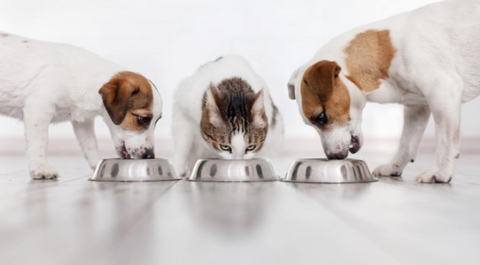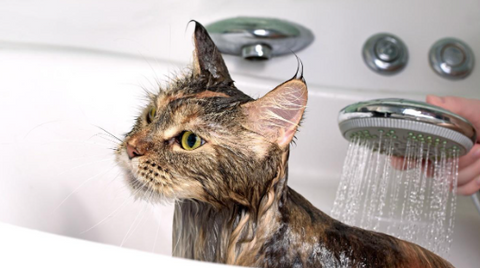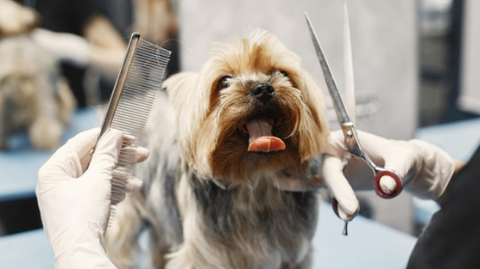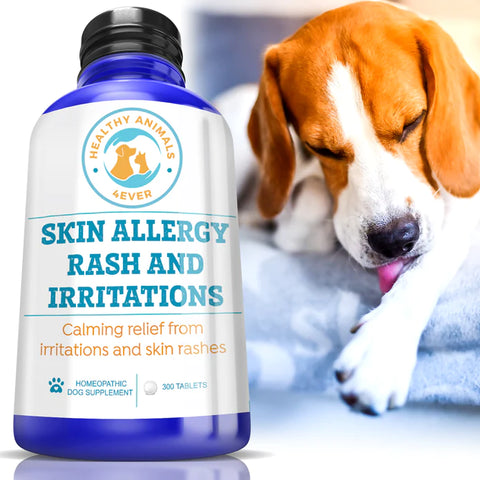Natural Solutions for Pet Shedding: Homeopathic Remedies and Grooming Techniques
Have you ever wondered why your pet sheds its fur and how you can help manage it naturally? We love our pets, but sometimes, dealing with their shedding can be challenging.
Seasonal shedding, when pets lose their old fur to make way for new growth, is a natural process. Pets shed their fur as the seasons change, and this shedding is influenced by factors like breed, age, and environment.
Homeopathic remedies offer a natural way to manage your pet's shedding. Instead of relying solely on conventional treatments, which may contain chemicals, homeopathy uses natural substances to support the body's own healing processes.
In this blog, we'll provide tips on managing your pet's shedding and explore how homeopathic remedies can help your pet maintain a healthy coat and minimize shedding.

Understanding Seasonal Shedding
Shedding is a normal process in which pets lose old or damaged fur to make room for new growth. This shedding cycle varies depending on factors like the breed of the pet, its age, and the environment it lives in.
Dogs and cats have different hair growth cycles. Some breeds shed more than others, and seasonal changes can trigger shedding in many pets. For example, pets often shed their thick winter coats in spring to adapt to warmer weather. Similarly, in fall, they may shed to prepare for colder temperatures.
Shedding serves several important purposes for pets:
- it helps them regulate their body temperature,
- remove dead or damaged hair,
- and can even provide protection against parasites and skin diseases.
However, excessive shedding can sometimes be a sign of an underlying health issue, so it's essential to pay attention to your pet's shedding patterns.
By understanding why shedding occurs and what factors influence it, pet owners can better manage their pet's coat and promote overall health and well-being.
Skin Allergy Rash and Irritation is a natural allergy remedy for all dogs. Helps heal irritated & infected skin. It may provide relief from insect bites. Provides a calming effect. All-natural formula. Easy to use.
Benefits of Managing Shedding
Shedding is a natural process for pets, but managing it has several benefits for both pets and their owners. Taking steps to control shedding can help keep your pet comfortable, maintain a clean home, and reduce the risk of skin problems and allergies.
Comfort:
- Excessive shedding can lead to discomfort for pets, especially if their fur becomes tangled or matted.
- By managing shedding, you can help your pet feel more comfortable and prevent potential skin irritation.
Cleanliness:
- Shedding can leave behind a lot of fur in your home, which can be challenging to clean up.
- By managing shedding, you can reduce the amount of fur that accumulates in your home, making it easier to maintain cleanliness and hygiene.
Skin Health:
- Shedding can sometimes be a sign of skin problems or underlying health issues.
- By managing shedding, you can monitor your pet's skin health more closely and address any issues before they become more serious.
Allergy Relief:
- Excessive shedding can aggravate allergies in both pets and their owners.
- By managing shedding, you can reduce the amount of allergens in your home and alleviate symptoms for allergy sufferers.
Overall, managing shedding is essential for promoting the health and well-being of both pets and their owners. Taking proactive steps to control shedding can help your pet stay comfortable, maintain a clean home, and reduce the risk of skin problems and allergies.
Homeopathic Remedies for Shedding
Homeopathic remedies offer natural solutions for managing shedding in pets. These remedies use highly diluted substances derived from plants, minerals, or animals to stimulate the body's own healing abilities.
Principles of Homeopathy:
- Like Cures Like:
One of the fundamental principles of homeopathy is the concept of "like cures like." For example, a homeopathic remedy made from a plant that causes watery eyes in healthy individuals might be used to treat a pet with allergies that cause similar symptoms.
- Minimum Dose:
Homeopathic remedies are highly diluted substances prepared through successive dilution. This makes them safe for pets, as they have minimal risk of side effects or toxicity.
- Individualized Treatment:
Homeopathy emphasizes the importance of individualized treatment based on each pet's unique symptoms, personality, and overall health. Taking into account not only the physical symptoms but also the emotional and behavioral aspects of the pet.
How Homeopathy Differs from Conventional Veterinary Medicine
- Holistic Approach:
Unlike conventional veterinary medicine, which often focuses on treating specific symptoms or diseases with drugs or surgery, homeopathy takes a holistic approach to healing. It aims to stimulate the body's natural healing processes and restore physical, mental, and emotional balance.
- Emphasis on Prevention:
Homeopathy strongly emphasizes preventive care and maintaining overall health and wellness to prevent illness and disease. This may include lifestyle changes, nutritional supplements, and regular check-ups to detect and address any imbalances before they manifest as symptoms.
- Safety and Gentle Healing:
Homeopathic remedies are gentle and non-toxic, making them safe for pets of all ages with underlying health conditions. They work with the body's innate healing abilities to promote wellness and vitality without causing harmful side effects.
Skin Allergy Rash and Irritation ia a natural allergy remedy for all cats. Helps heal irritated & infected skin. It may provide relief from insect bites. Provides a calming effect. All-natural formula. Easy to use.
Incorporating homeopathic remedies into your pet's care routine supports their natural shedding process and promotes a healthy, shiny coat. With the guidance of a veterinarian or homeopathic practitioner, you can find the proper remedy to help your pet look and feel their best.
Here are some common homeopathic remedies that are believed to help manage your pet's coat:
Silicea (Silica):
- Silicea is often recommended for pets with dull, dry coats or brittle hair.
- It is thought to support healthy coat growth and strengthen hair follicles.
Sulphur:
- Sulphur is a homeopathic remedy for pets with itchy, irritated skin and excessive shedding.
- It may relieve symptoms associated with allergies and promote a healthier coat.
Thuja occidentalis (Thuja):
- Thuja is often recommended for pets with thick, greasy coats or those prone to developing warts or skin growths.
- It is believed to help balance oil production in the skin and promote a cleaner, healthier coat.
Arsenicum album (Arsenicum):
- Arsenicum is a homeopathic remedy that may be helpful for pets with skin conditions characterized by dryness, itching, and scaling.
- It is thought to support overall skin health and alleviate symptoms associated with shedding and dandruff.
Nutritional Support
Good nutrition plays a crucial role in maintaining a healthy coat for your pet. You can support their overall skin health and reduce excessive shedding by providing essential nutrients.

Here are 6 key nutritional considerations to help manage your pet's coat:
- Balanced Diet:
- Ensure your pet's diet is balanced and provides all the essential nutrients they need for healthy skin and coat.
- Look for high-quality pet foods that contain protein, omega-3 and omega-6 fatty acids, vitamins, and minerals.
- Omega-3 Fatty Acids:
- Omega-3 fatty acids, found in fish oil and certain plant oils, benefit skin and coat health.
- They help reduce inflammation, improve skin barrier function, and promote a shiny, lustrous coat.
- Consider adding a fish oil supplement to your pet's diet, but consult with your veterinarian first to determine the appropriate dosage.
- Omega-6 Fatty Acids:
- Omega-6 fatty acids, found in vegetable oils and animal fats, are also crucial for skin and coat health.
- They help maintain the integrity of the skin barrier and prevent moisture loss, which can help reduce dryness and itching.
- Ensure that your pet's diet contains adequate levels of omega-6 fatty acids.
- Protein:
- Protein is essential for healthy coat growth and maintenance.
- Ensure that your pet's diet contains high-quality protein sources, such as meat, fish, eggs, and legumes.
- Protein provides the building blocks necessary for strong, healthy hair follicles and promotes a shiny, resilient coat.
- Vitamins and Minerals:
- Certain vitamins and minerals, including vitamin E, vitamin A, zinc, and biotin, are essential for skin and coat health.
- These nutrients help support skin barrier function, regulate oil production, and promote hair growth.
- Consider feeding your pet a balanced diet that includes a variety of nutrient-rich foods, or talk to your veterinarian about adding a multivitamin supplement to their diet if needed.
- Hydration:
- Proper hydration is essential for maintaining healthy skin and coat.
- Make sure your pet has access to fresh, clean water at all times, especially if they eat dry kibble, which can be dehydrating.
- You can also add moisture to your pet's diet by feeding wet food or adding water to their dry food.
All Digestive is a natural digestive support for dogs. Helps with stomach upset, diarrhea, and gastritis.It aids in restoring digestive balance and your pet's comfort. All-natural formula. Easy to use.
Providing your pet with a balanced diet rich in essential nutrients can help support their skin and coat health from the inside out.
Environmental Factors
Environmental factors can significantly impact your pet's shedding patterns and overall coat health. By making some simple adjustments to your pet's environment, you can help minimize shedding and promote a healthier coat.

Here are 6 environmental factors to consider:
1. Humidity:- Dry air can contribute to dry, flaky skin and increase shedding.
- Consider using a humidifier in your home, especially during the winter months when indoor heating can dry out the air.
- Maintaining optimal humidity levels can hydrate your pet's skin and reduce shedding.
- Extreme hot and cold temperatures can stress your pet's body and affect their coat health.
- Ensure your pet has access to a comfortable environment with adequate ventilation and protection from the elements.
- Avoid exposing your pet to prolonged periods of extreme heat or cold, leading to dehydration, skin irritation, and increased shedding.
- Indoor air quality can impact your pet's respiratory health and overall well-being.
- Dust, pollen, and other airborne allergens can trigger shedding and exacerbate skin problems.
- Keep your home clean and well-ventilated, and consider using air purifiers or filters to remove allergens from the air.
- Regular grooming is essential for managing shedding and maintaining a healthy coat.
- Brushing your pet's fur removes loose hair and prevents mats and tangles from forming.
- Use a brush or comb suitable for your pet's coat type, and groom them regularly to keep their fur clean and healthy.
- Outdoor factors like pollen, grass, and other environmental allergens can trigger shedding and skin irritation in pets with allergies.
- Keep your pet's outdoor environment clean and free of allergens as much as possible.
- Wipe your pet's paws and fur after they've been outside to remove allergens and prevent them from being tracked into your home.
- Stress can contribute to shedding and exacerbate skin problems in pets.
- Minimize stressors in your pet's environment and provide plenty of relaxation and mental stimulation opportunities.
- Ensure your pet has a comfortable, safe space to retreat and unwind when needed.
Anxiety and Over-Reaction from Fear is a natural remedy for calmness and reduced fear in cats. It helps minimize stress and fear responses. Useful for generalized, separation, social, and environmental anxiety. All-natural formula. Non-drowsy relief. Easy to use.
Addressing environmental factors that contribute to shedding can help minimize your pet's hair loss and promote a healthier, more comfortable coat. Pay attention to your pet's environment and make adjustments as needed to support its overall well-being.
Grooming Techniques
Grooming is crucial in managing your pet's shedding and maintaining a healthy coat. Following some simple grooming techniques can help minimize shedding and keep your pet looking and feeling their best.
Here are some grooming tips to consider:
Regular Brushing:
- Brushing your pet's fur regularly helps remove loose hair and prevent mats and tangles from forming.
- Use a brush or comb appropriate for your pet's coat type, and brush them gently but thoroughly.
- Aim to brush your pet at least a few times a week or more frequently for pets with long or thick coats.
Bathing:
- Bathing your pet regularly can help remove dirt, excess oil, and dead skin cells from their coat, reducing shedding and keeping their skin clean and healthy.
- Use a mild pet shampoo formulated for your pet's specific needs, and rinse their fur thoroughly to remove all traces of shampoo.

Trimming:
- Regularly trimming your pet's fur can help prevent excessive shedding and keep their coat neat and tidy.
- Trim any long or overgrown hair around your pet's face, ears, paws, and tail to reduce the risk of mats and tangles.
- Be careful not to trim too close to the skin, and use sharp, high-quality grooming scissors for best results.
Deshedding Tools:
- Invest in de-shedding tools to remove loose hair from your pet's coat.
- Tools like shedding brushes, grooming gloves, and undercoat rakes can help remove dead hair and reduce shedding, especially during peak shedding seasons.
Professional Grooming:
- Consider taking your pet to a professional groomer for regular grooming sessions, especially if you need more confidence in your grooming skills or if your pet has a particularly thick or difficult-to-manage coat.
- Professional groomers can provide expert grooming services tailored to your pet's specific needs.

By incorporating these grooming techniques into your pet care routine, you can help manage shedding and promote a healthy, shiny coat for your pet.
Experiment with different grooming tools and techniques to find what works best for your pet. Be patient and gentle during grooming sessions to ensure a positive experience for both you and your pet.
The Bottom Line
Managing your pet's shedding with homeopathic remedies and proper care techniques is essential for their overall health and well-being. By understanding the factors that contribute to shedding and implementing natural solutions like homeopathy, nutritional support, and environmental adjustments, you can help keep your pet's coat healthy and minimize shedding.
Remember to consult with a veterinarian or homeopathic practitioner for personalized recommendations and to prioritize regular grooming to maintain a clean, comfortable coat for your pet.
Be patient and consistent in your efforts. It may take some time to see results, but with dedication and proper care, you can help your pet look and feel their best.












